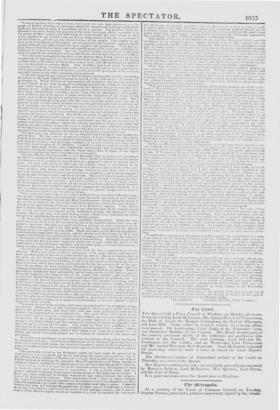Cbr
At a meeting of the Court of Common Council on Tuesday, Deputy Stevens presented u petition numerously signed by the inhalu- twits of London, who complained, that in consequence of the regale. :ions of the Commissioners of Sewers, they wer: compelled to pur- "Llas:' gas at a monopoly price. The petition stated that— t' Tile Commiss!oners of Sewers are accustomed to advertise for contracts to au;ply the stieet lights of the city of London, but that only two companies are aliowtd to lay down their pipes in the City, and that those two comp:mica have, by private arrangement amongst themselves (as would naturally be the case,) parcelled the City out between them ; and, by confining themselves each to eaeir own particular district, it is quite obvious that the advertisement fur con- tracts is a dead letter, and, not wily are the public collectively, but the shop- • s and other inhabitants, are individually deprivA of the advantages which "mild result from fair and open competition, if other companies were permitted, 7azaer proper regulations, to supply the City."
Furthermore, the petitioners said they were informed that-
" The ' Lendon Gas Company ' are desirous to lay down pipea for the supply r.or the City, but the; are unable to do so, unless they be permitted to lay down a attain across Blachfrsars Bridge for conveying the gas into the City ; that it is asserted the same can be done without the slightest inconvenienae, and the corn. play are willing. if permitted to lay oewn pipes in the City, to do so within lifw shortest possible time, under the dirt etion of the Commissioners of Sewers, ard to enter into bonds obliging them to lay down the same between the hours • iright, in the evening and eight in the morning, and to close up each portion • the street as they id tweed, so that the inhabitants and shopkeepers may not "!le exposed to any inconvenience during the usual hours of business."
T;Iss prayer of the petition, therefore, was, that the London Gas elimpany be permitted to convey gas into the City over Blackfriars Cridge.
Mr. Charles Pearson appeared at the bar as counsel for the peti • eioners ; and he also held a retainer for the London Gas Company, ,wilo had been requested to supply the City with gas Thisrequest to the company bore the signatures of upwards of four thousand of the gas consumers within the City, who were dissatisfied with the present zr.ode of supplying them, not alone because the price charged was higher than ruaal be, but htesuse the monopoly which the present companies possessed 12.ibled them arbitrarily to impose vexatious regulations more annoying than csam the excess of price; although that, as affecting an article of necessity, af- forded a fair ground of complaint. The company assured the inhabitants that, it permitted to supply the City, they would enter intu an engagement to lay tauten the pipe-, by night, and close the pavements during the day, so as effectu- al) to prevent eh., shopkeepers from sustaining inconvenience or injury. The company making this offer were not a were speculative company, proposing to wander in the maz:a of untried theories, they had already laid down five hun- load miles uf pipes, through which they were supplying some of the most im- portant districts of the Metropolis ; they had contracts with parishes surround- ing the City for lighting the streets, in which they gave the highest satisfaction ; Onect Garden, the Colosseum, and several other theatres, were lighted by this company ; as were also Regent Street, Bond Street, and even Belgrave Square; for such great improvements had taken place of late years in the quality of gas, that it had become not alone an article of necessity to the humble tradesman, aNat was received as a luxuty in the mansions of the great, and (as the Lord • or well knew) in palaces and drawing-rooms this brilliant light was daring tu contend for the supremacy with the more modest luminaries with which his +Lordship had been au long and so happily acquainted. (Laughter.) The 'object of the petition was immediately to raise the broad question as to the ex- pediency of allowing competition in the City, and they rested their case on the fact that, while the great consumption of gas within the City would allow of its being supplied at a lower rate than in a less populous district, the inhabitants of the suburban districts could obtain a supply at a lower rate, and without the aexatious restrictions to which the citizens of London were exposed.
In reply to a question from Mr. Dixon, Mr. Pearson said that the 'charge in the suburbs for one burner was 2/. 1 Is. Gd. per annum, and in the City 3/, 8s.
Mr. Savage objected to the introduction of another company into mite City in consequence of the inconvenience of taking up the pave- ments.
Mr. Wilson said, that when this same company on a former occasion applied for leave to lay pipes in the City, it turned out upon inquiry before a committee, that they did not propose to supply gas at a cheaper rate than it was now supplied to the inhabitants. Mr. Hale proposed that the petition should be referred to the Com- siissioners of Sewers.
Mr. R. L. Jones moved that it should also be referred to the Black- hiars Bridge Committee, and both motions were agreed to. A petition from the Chartered Gas Company, controverting the ;statements of the petition presented by Deputy Stevens, was referred to the same Committees.



























 Previous page
Previous page